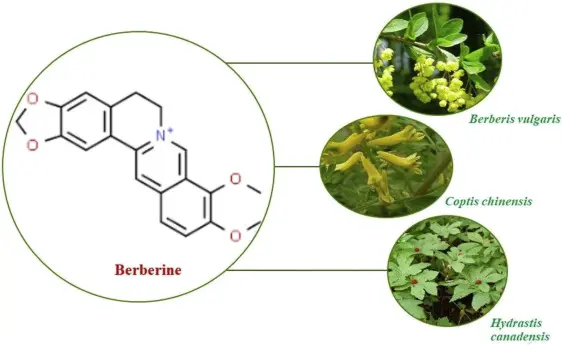Berberine's Neuroprotective Effects: New Advances in Research
Berberine, a natural isoquinoline alkaloid extracted from Berberis aristata, has been clinically utilized for treating diarrhea. Recent studies reveal its broad neuroprotective properties, offering potential therapeutic solutions for Alzheimer’s disease (AD), depression, anxiety, neurological injuries, Parkinson’s disease (PD), epilepsy, and more.

Key Findings
- Alzheimer’s Disease
Berberine addresses key pathological features of AD by:
Reducing amyloid β-protein (Aβ) accumulation.
Enhancing neuronal survival and cognitive functions in mouse models.
Modulating critical pathways like p-ERK/eIF2α/BACE1 to inhibit Aβ production and autophagy, thereby alleviating neurodegeneration.

- Depression and Anxiety
Berberine improves behavioral symptoms by:
Regulating ATP production and AMPK expression.
Promoting brain-derived neurotrophic factor (BDNF) to reverse miRNA-mediated inhibition of hippocampal growth.
- Neurological Injuries
Berberine mitigates cell apoptosis and oxidative stress in models of brain injury by:
Activating PPARγ and inhibiting NF-κB.
Regulating signaling pathways like PI3K/Akt and SIRT1/HIF-1 to promote neuronal repair and reduce inflammation.
- Parkinson’s Disease
Berberine shows promise in treating PD by:
Enhancing dopamine levels via gut microbiota modulation.
Reducing inflammation and α-synuclein accumulation.
Supporting mitochondrial function and protecting neuronal health.
- Epilepsy
In epilepsy models, berberine effectively:
Reduces seizure frequency by lowering oxidative stress markers.
Restores hippocampal antioxidant enzyme levels, preventing further neuronal damage.
Implications for Therapeutics
Berberine's ability to regulate inflammatory pathways, reduce oxidative stress, and protect neuronal integrity makes it a promising agent for managing CNS disorders. Future research will explore its clinical applications, dosage optimization, and potential in combination therapies.










